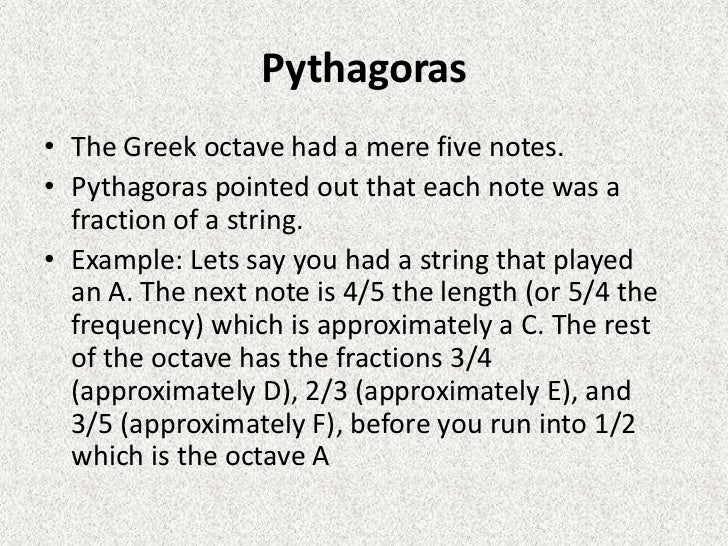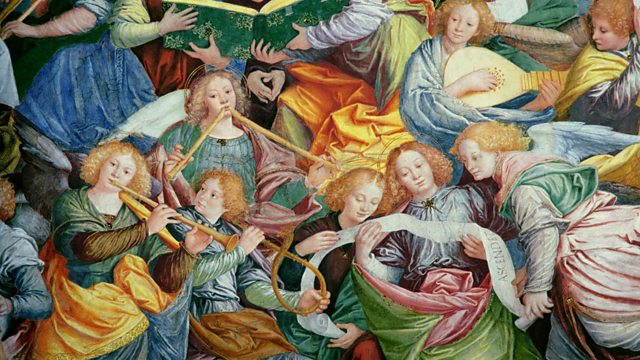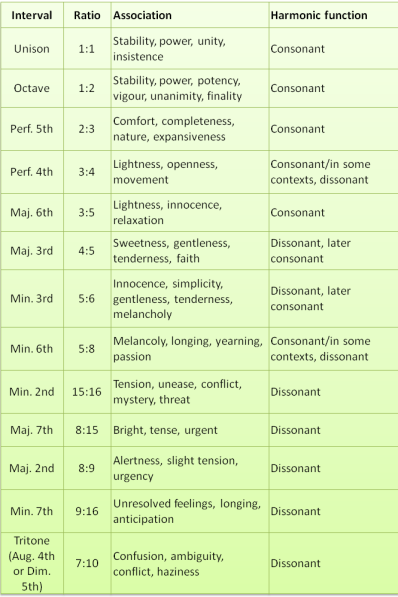PYTHAGORAS and MUSIC PART 1
PYTHAGORAS and MUSIC PART 2
PYTHAGORAS IN MOTION
PYTHAGOREAN MONOCHORDS

HARMONIC OVERTONES

 |
| http://www.jazclass.aust.com/lessons/jt/jt09.htm |


Thought for the Day:
The Basics of Sound;
The Overtone Scale
The Overtone Scale
Leonard Bernstein Explains:
Harmonic Series I
Leonard Bernstein Explains:
Harmonic Series II

THE OVERTONE SERIES
EXPLAINED BY DAVID BURT
https://www.youtube.com/watch?v=w2CA0w85Hfw

PYTHAGORAS MUSIC BASED ON
MATHEMATICAL CALCULATION
Pythagoras discovered that a monochord











 |
| http://www.slideshare.net/cogleysclass/math-and-music |
MATHEMATICAL CALCULATION
Pythagoras discovered that a monochord
(single tone) vibrates not only at its
fundamental frequency, but also in partial
segments – halves, thirds, fourths, etc., to
a theoretically infinite degree. The harmonic
series are the notes (or partials) that are
created when a fundamental note is struck.
It is the presence of these overtones that
creates tonal color, and that helps us to
differentiate the sounds of a harpsichord
and a piano, a trumpet and a trombone, or
one voice and another. Humans do not
perceive overtones much past the fifteenth
partial, because as overtones become
higher, they become increasingly difficult
to hear.
 |
| The music of the spheres: the elegant and poetic idea that the revolution of the planets generates a celestial harmony of profound and transcendent beauty |
READ ABOUT PLATO and PYTHAGORAS:
by NPR STAFF
http://www.npr.org/templates/story/story.php?storyId=
128288987&sc=nl&cc=brk-20100706-1208&ps=brk-mp
128288987&sc=nl&cc=brk-20100706-1208&ps=brk-mp
 |
| http://truth-zone.net/forum/science-and-physics/63418-skycentrism-we-live-inside-the-earth.html?start=620 |
It sounds like something out of a Dan Brown
novel, but a scholar in Manchester, England,
claims to have found hidden code in the ancient
writings of Plato. If true, the secret messages
would have made the ancient philosopher and
mathematician a heretic in his day.

Jay Kennedy tells NPR's Guy Raz that his
discovery was partially luck. Looking at Plato's
works in their original scroll form, he noticed
that every 12 lines there was a passage that
discussed music. "The regularity of that
pattern was supposed to be noticed by
Plato's readers," Kennedy says.

Music in ancient Greece was based on a 12-note
scale, unlike the eight-note scale of modern
Western music. Kennedy posits that Plato
deliberately inserted discussions of music every
12 lines to send a secret, musical message.

What Plato couldn't tell people was that he was a
closet Pythagorean. Pythagoras and his followers
believed that mathematics and music were the
key to the universe.

"The Pythagoreans realized that when we hear
beauty and music, when we hear notes
harmonizing, that's because the notes have
simple ratios, like 1:2 or 3:4," Kennedy explains.
"So the beauty of music is direct perception of
the mathematical order underlying the world.
They worshipped that mathematics."

But the Pythagoreans were a persecuted sect,
Kennedy adds, sometimes violently persecuted.
"They were a threat to traditional religion, like
many new sects." Plato's own teacher, Socrates,
was famously executed for religious heresy.

"Simply put, they were threatening to overthrow
the gods on Olympus and put numbers and
mathematics in its place. Prior to Socrates being
executed, a number of other philosophers were
banished or fled because of threats to themselves.
It was dangerous in those days to be a philosopher."

As far as Kennedy can tell, Plato's message was
one of solidarity simply by acknowledging the
relationship between music and mathematics,
but he suspects there's more to it. "Perhaps
some scholar will find that — in The Republic,
at least — that there is something like a melody
or a score embedded in the text," he says.

If that's true, then we've read only half of Plato's
writings. "There are all these hidden layers of
meaning which will enrich our understanding of
Plato," Kennedy says. And maybe what else
Plato has to say could help us today.

"Plato's philosophy shows us one way to combine
science and religion," Kennedy says. "The culture
wars we're having today — about evolution for
example — see science and religion as two
polarized opposites. Plato's hidden philosophy
shows us that he combined an emphasis on
mathematics with an emphasis upon beauty,
music, art and divinity. The founder of western
culture, in fact wanted us to combine science
and religion."

.jpg)



.gif)



.jpg)
.jpg)





.gif)






